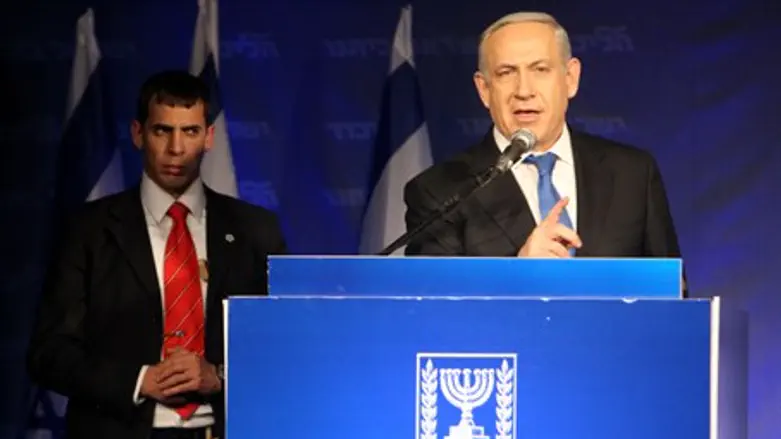
The jockeying for position has begun, with leaders of the left and far left trying to form blocs to topple Prime Minister Binyamin Netanyahu. But it is likely the prime minister -- a known master of adapting rapidly in changing circumstances -- can avoid a 'jump to the left' by sidestepping the extremes on either side.
With 99 percent of the votes counted as of 9:00 a.m. Wednesday morning, the Right and Left blocs appeared to tied at 60 mandates each – but only if one counts the combined Israeli Arab parties among the Left bloc.
The necessity of having to jockey for position at all came due to the dramatic drop in mandates won by the combined Likud-Yisrael Beytenu list, a total of only 31 seats, down from 42 in the present government.
The surprise of the night was the victory of centrist newcomer Yair Lapid, until a year ago a TV news anchorman. He leads the pivotal “Yesh Atid” (There is a Future) party, with 19 seats.
The left-wing Labor party, led by another former journalist, Shelley Yechimovich, won 15 mandates, a disappointment to her supporters, who were hoping to regain what they lost when Ehud Barak left to form the now-defunct Independence party .
Right-wing party Bayit Yehudi, led by another newcomer, former IDF special ops commando officer and hi-tech entrepeneur Naftali Bennett, and hareidi-religious Sephardic Shas party each won 11 seats. Hareidi-religious United Torah Judaism received 7 mandates, according to the Central Elections Committee tally.
The leftist Hatnua party led by former foreign minister Tzipi Livni and the far-left Meretz party each won 6 seats.
The combined United Arab List-Ta’al party won 5 seats, and the Arab-Jewish “Hadash” (New) party won 4 seats and the more extremist Arab Balad party won 3 seats.
The once-powerful Kadima party founded by former Prime Minister Ariel Sharon to pass the Gush Katif "disengagement" appears to have squeaked in with 2 seats.
The Arab parties include Knesset members such as Ahmed Tibi and Haneen Zouabi, who have bluntly spoken of the State of Israel as an enemy to be eliminated, and their hope for the Palestinian Authority, as “Palestine” to rise in its place.
A number of mainstream political parties also include Israeli Arabs on their lists, among them Labor, Kadima, Likud and Yisrael Beytenu. In fact, large numbers of Israeli Arab voters do not even vote for Arab parties at this point, disillusioned by their MKs’ focus on representing constituencies in the Palestinian Authority rather than their own Israeli voting blocs's social welfare needs.
It is partly for this reason that no Israeli coalition has fully trusted the Arab parties to join a government. Such a position would provide them with access to highly sensitive information not necessarily made available to other Knesset members – and which could jeopardize national security. Nevertheless, individual Israeli Arabs have held, and continue to hold, very high positions in the political, legal and diplomatic fields.
Final voter turnout was tallied 66.6 percent – a higher showing than in 2009 – but for the leading Likud-Beytenu list, the message was clear: “change is in the air.”
Prime Minister Binyamin Netanyahu, famous for his ability to rapidly adapt to changing situations, acknowledged there would be a new type of government in the coming days.
“I thank you for giving me the opportunity for a third time to lead the State of Israel,” he said in his speech at party headquarters late Tuesday night. “It is a great honor but also a great responsibility... I see many partners in our mission and by joining hands in a wide coalition we can succeed.
“I believe that the results of the election are an opportunity to make the changes that the people of Israel are longing for.”